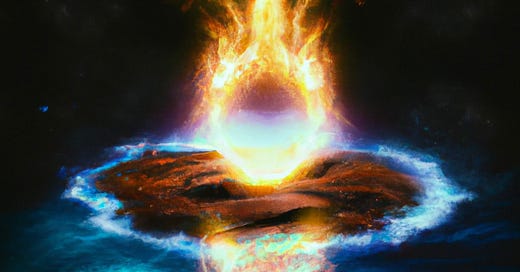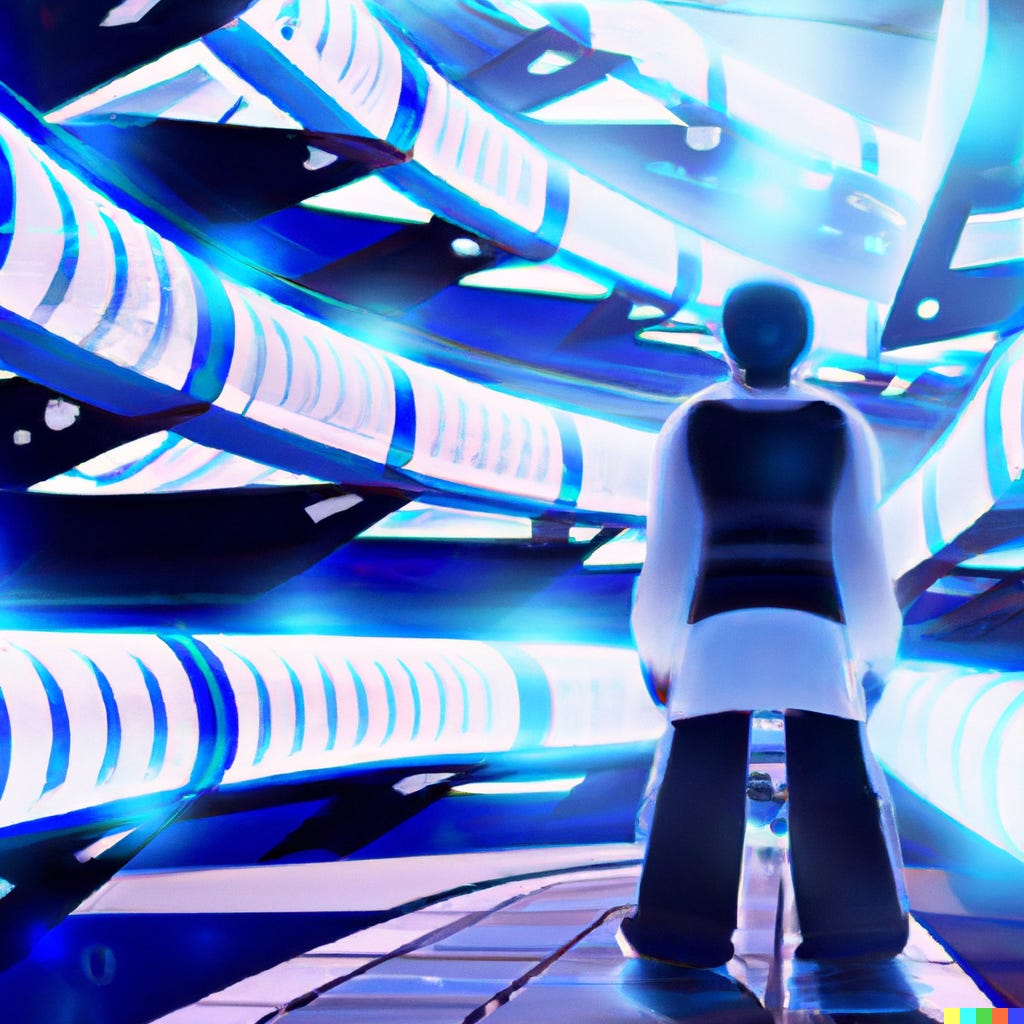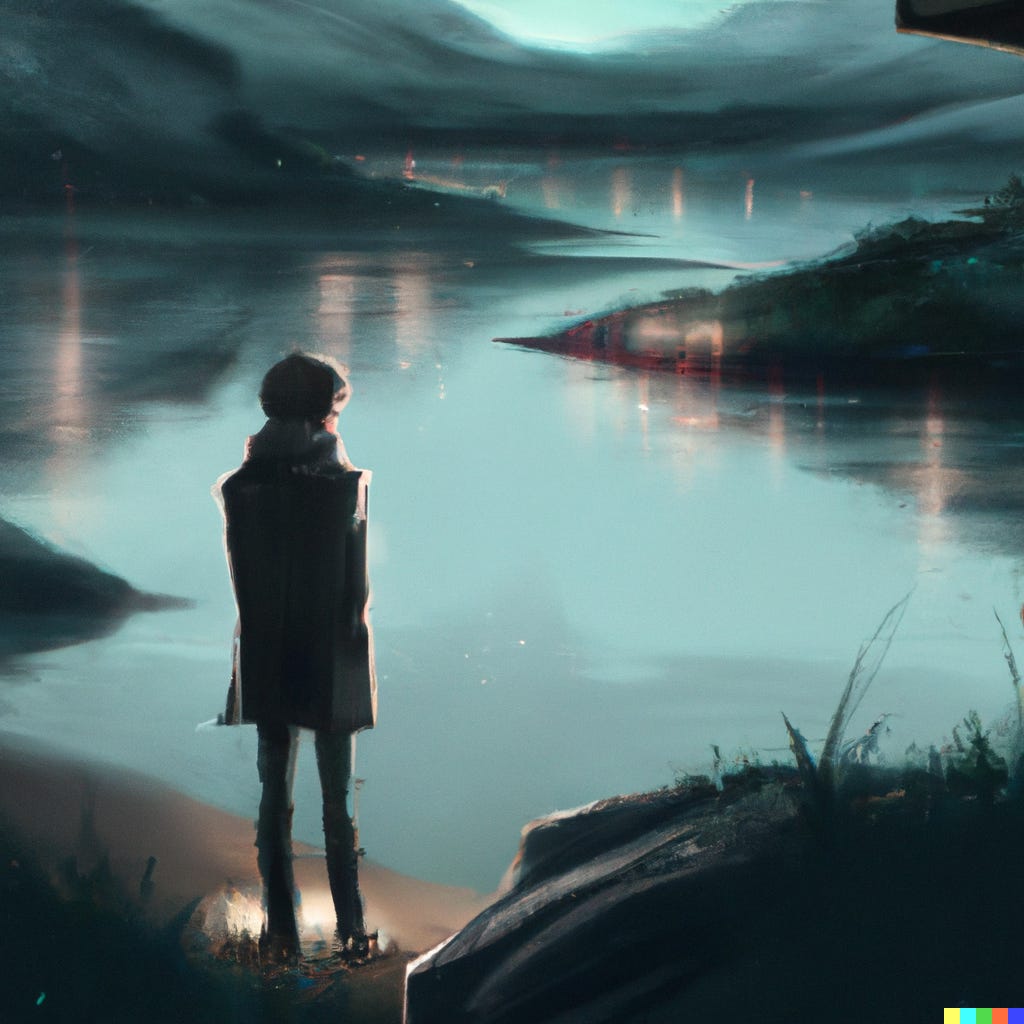[53] Life is about Renaissance, not Checklists
GM Readers,
Today we have some musings around checklists, change, freedom and frameworks for life.
Fun Fact: This was the first essay I wrote in my journal during the pandemic in 2020. I wrote it to unpack all the chaos and rapid change in my life at the time. (Lightly edited here for readability)
I recently re-read it and wanted to share it ahead of next week’s 1-year reflection since writing Life in Color.
I hope this essay brings more questions than it does answers.
Hope you enjoy!
📈 Enjoy reading Life in Color?
To further support Life in Color, follow us on Twitter. 🐦 🧵 🧶
Everyone should have a framework for life – principles that help guide us through the chaos that normal life has become.
What is this chaos?
Today no matter what you do, who you are, and where you are, your attention is constantly being taken by external forces. Some good, but mostly pretty bad. Worse, the bad burns our attention (arguably our most limited resource) until we have no attention left to focus on the good. Everything in our lives becomes heavily influenced by external forces.
We fall into this spiral over and over again. We soon deprioritize things like purpose, mission, living in the present and enjoying life. All of these things that define what it means to be human soon get replaced with society’s version of these things.
Many of us are busy pursuing dreams and careers, but how many of us have stopped to question if they are indeed our dreams and careers?
Are we on a path we chose for ourselves or is reality the exact opposite of this?
Let’s explore.
Life through Other People’s Checklists
We are taught at an early age to pursue a definition of success that was not defined by us, but usually by our parents (or other adults in our lives when we were growing up). Their definition of success for us was also heavily influenced by societal norms that they were influenced by and subscribed to.
This definition of success is prescribed to us. Of course there is a logical reason for this: kids and children need to be molded so that they grow up to be functional adults. That’s how modern society works and functions.
One of the previous generation’s main jobs is to set the frameworks and checklists that help us grow up and reach society’s definition of success (and what it means to be a functional adult).
This model isn’t bad per say. It works for the first twenty years of life, plus or minus. It provides a default model to help us through life — giving us a stable foundation and an environment that is necessary to enable us to “figure out who we are.”
But, growing up in modern society, many of us were never taught how to transition into our true selves.
Instead we graduate from one checklist to another.
🤔 🤔 🤔
For those who went to college: one of the biggest decisions we make is which major to choose. When we choose “X” major, we receive another set of checklists that we must complete and execute. These checklists aren’t even unique and personalized to the individual. It’s a standardized list of to-do’s that everyone who “subscribes” to “X” major receives.
It’s a V2 (version 2) of a checklist similar to the one we got when we were younger. Except this time, it’s prescribed by another system and institution.
Okay fine… but maybe college isn’t the place to have unique dreams, maybe it really comes later in life. Maybe you get to have unique dreams when you graduate college and that’s when you really have the most freedom to decide what you want to do in life.
But your decision to decide what you want to do after college has been heavily molded and influenced by your time at college. So what you can really choose is quite limited.
It’s not that society makes it impossible. One can argue, if at the end of the program you wanted to say “screw you” to “X” major and go do something completely different, you technically can. But the probability of actually doing it is lower than staying the course (for the average person). The status quo or stay the course option is very powerful because it’s been reinforced by your conditioning for the last x-years you’ve been in your program.
So you end up rationalizing: “I’ll take the type of job that most people graduating with “X” major take. I can set up even more stability for myself. Once I have that stability, then I can finally decide and pursue what I really want to do.”
After spending time in that job you took from following the checklist, you are now in your mid / late twenties.
Meeting the Resistance
The cards are already stacked against you to change… for a few reasons.
The first is that you’ve spent twenty plus years (whether you wanted to or not) subscribing to a specific framework and model of life. Change means ripping all of that apart and feeling like you are starting over. This is hard.
How does one expect to take a risk like that? Hitting a restart and almost admitting that you have been on the wrong path since you were born and now all of a sudden you want to completely change and do something original?
How many of us would jump into the unknown and leave behind the known?
Second, most external forces (people and systems around us) prime us and encourage us not to change and just accept the status quo.
Some tell us not to change because they argue the stability is great… so why change it. Their default condition optimizes for stability and things like “happiness” and “freedom” are second-order priorities.
Others project onto you what they wish they could have. They are usually envious and jealous of your confidence to try something new. They help you focus on all the risks and chaos from taking a different path.
Another group will outright be naysayers. They come up with every possible reason on why it won’t work. They aren’t shy about it because they believe their logical framework supersedes yours. They cannot stand the idea that they could be wrong.
The resistance inserts doubt in your mind. [See our essay on Why Change is So Hard?]
Once in a while, you come across people who are encouraging and will keep you accountable to achieve something greater (i.e. your purpose). These people genuinely care about you.
If you find these people, hold onto them!
So… it seems like the external forces don’t really help in your grand quest to find yourself.
What about internal forces, your inner selves, can’t they offer guidance?
Your Narrative
The inner selves are best equipped to help you with this journey and offer guidance.
The challenge here is knowing which inner selves to activate (e.g. the self that is confident) and which inner selves to quiet (e.g. the self that has imposter syndrome).
Remember, you spent most of your life up to this point being conditioned in systems that do not necessarily help you think about how to: pursue your dreams, find your purpose, take a big risk, get off the conveyor built for you by others. E.g. it’s unlikely at your job, your company wants to help you figure these things out. Your inner selves will likely, at least in the beginning, mirror the tendencies of your external environment.
The part of you that wants to change is a spark that wants to grow into a fire, yet it’s surrounded by barrels and barrels of water that at times feel like oceans that are ready to extinguish this ember.
And for many people, the ember gets extinguished.
The question is, does it have to be this way?
Just because freedom is hard doesn’t mean it’s unattainable. And I don’t mean in the sense of checking yet another box on some checklist.
Rather, freedom is a state of being that one can turn on and have it be their default mode of operation — so that one may pursue their purpose and passions.
But how?
This is about finding your narrative — the story you tell yourself, where you are both the author and the protagonist.
Narratives can and will change, the key is not to focus on “attaining” the narrative and treating it like a goal but rather treat it as a way of life. The point is to become your narrative — to enjoy the becoming.
Your narrative has more power when it’s clearly defined internally and also reconciled externally. In other words, the story that you tell yourself should make you the protagonist in the center with other characters in your life that have varying levels of influence on you.
You must understand your life from your own lens.
Having a narrative allows you to first understand the world around you and define for you what reality is. No one truly knows what reality is, all any one individual has is their reality. No two people will see reality the same and for obvious reasons: our perspectives are unique to ourselves. We cannot ever truly see what others see, but others also can never truly see what we see.
Having a narrative that you define and that you can call your own is critical.
Otherwise your perspective on life isn’t yours, but rather a perspective some external force created for you.
This is where a framework for life is useful.
Framework for Life
So what is a framework for life?
At heart, this is about crafting your own operating model for life. The best framework for life is the one that you create to match your narrative and how you want to see, understand and engage with the world.
For some, this is viewing human beings as computers, where our genetic makeup is a series of human code that determines an individual to be one way or another.
For myself, it’s seeing life as the hero’s journey and arc through the concept of a (video) game — we become the hero we want to become through a series of experiences and crafts we invest time into defining and honing. In video games, these are called skill trees.
Yet for others, they believe the world is a simulation that they are part of.
Whatever it is, defining a framework for yourself is critical. The key here is that it’s your framework, your narrative, your journey.
You might go through all of this and realize you are already on the path you want to be on and that’s is great… at least now you know it’s your path.
Frameworks for life also need to change and evolve over time because as you gain more experiences, perspectives and more information, you need to add all of these into your operating model. Change and evolution is critical and inevitable.
Change and evolution is what allows us to discover the life we want and not the life that external forces want for us.
All of this is about freedom, individuality and becoming yourself.
It’s not about freedom to do something, but rather freedom from something. The freedom from external forces and more importantly the freedom from our old selves.
We have a tendency to copy others and copy the best-in-class frameworks for life that someone else has defined. This is one approach, but this sort of thinking gives you the illusion of freedom.
To achieve freedom, we must quiet the external forces and to a larger extent, our old selves. The latter, especially the parts of us that live in the past, can largely be seen as an external force now. This does not mean we have to do something drastic like have no memories and close ourselves off to the external world, but rather this means we have to make peace with all these different elements that has influenced us.
In the process of defining your narrative and framework for life, you get comfortable with accepting and embracing change which leads to growth.
The productivity junkies and the greats call it the “growth mindset.”
In a world that is constantly changing with new technologies impacting our lives, you must create a system to constantly reinvent yourself.
Life is about renaissance.








